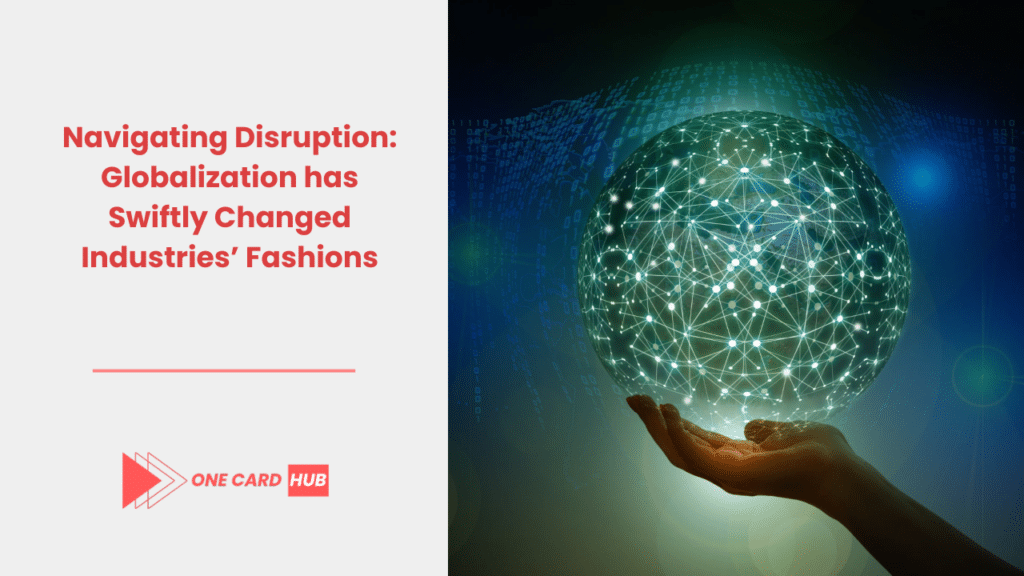
Navigating Disruption: Globalization has Swiftly Changed Industries’ Fashions

The novelty of the global industry disruptors is omnipresent now and this is a new norm. Some of these developments are technological, while others are to do with how consumer behavior is changing. The patterns are business. Organizations that understand these trends have an opportunity to not only manage, but also seize the moment as a way to achieve results in the face of disruption. In this article, we will focus on the main dynamics that push the transformation to take place in one industry or another worldwide.
Technological Advancements
The fact that technology is being developed at breathless speed comes as a hindrance to its impact through disruption. AI, IoT, and blockchain are undoubtedly the latest generation of technologies, that have fundamentally changed the way, you operate, due to the way they revolutionized your operations, customer experience, and business models.
• AI (Artificial Intelligence, and Machine Learning are two advanced technologies that are currently playing an integral role in most business sectors by helping with the decision-making process, automating tasks and personalizing customer experiences. The scope of AI is very wide as well as deep, from medical diagnostics to anticipatory maintenance in factories.
• The Internet of Things (IoT) is providing us with more connectedness by allowing things to interact among each other to have better operations. For an instance we could say that in agriculture, IoT devices can serve as sensors for monitoring moisture levels and could also possibly be set up to do the irrigation automatically. It could greatly improve the efficiency of and at the same time sustainability.
• Blockchain technology is changing the field of transparency and security regulation due to its implementation in the financial services sector and supply chain management. Through the facilitate of decentralized and immutable transaction registry, blockchain technology is going to be the trusty partner in e-commerce scenes.
• AI (Artificial Intelligence, and Machine Learning are two advanced technologies that are currently playing an integral role in most business sectors by helping with the decision-making process, automating tasks and personalizing customer experiences. The scope of AI is very wide as well as deep, from medical diagnostics to anticipatory maintenance in factories.
• The Internet of Things (IoT) is providing us with more connectedness by allowing things to interact among each other to have better operations. For an instance we could say that in agriculture, IoT devices can serve as sensors for monitoring moisture levels and could also possibly be set up to do the irrigation automatically. It could greatly improve the efficiency of and at the same time sustainability.
• Blockchain technology is changing the field of transparency and security regulation due to its implementation in the financial services sector and supply chain management. Through the facilitate of decentralized and immutable transaction registry, blockchain technology is going to be the trusty partner in e-commerce scenes.
Shifts in Consumer Behavior
Today's consumers are the best truth-fighters and have more access to current information, advanced technologies, and environment than ever before. This shift in consumer behavior is driving companies to adapt their strategies in several ways:This shift in consumer behavior is driving companies to adapt their strategies in several ways:
• Sustainability and Ethical Practices: Green revolution has transformed the way consumers see brands today. Increasingly they opt for those which are both sustainable and ethically driven. This trend has an answer in introducing more environment-friendly business practices and companies’ admit what is going on inside the supply chain.
• Demand for Personalization: With the digital revolution underway, the digital age is introducing a need for personalized experiences. Companies are using data analytics and AI to redesign their portfolios to match the personal desires and activities of the end user.
• Digital-first Engagement: Online retail's instant changes are a fact that online buyers feel they must be offered perfect service. From e-commerce to digital banking, industries are feeling and driving investments on new channels to satisfy these needs and are trying to personalize the experience.
• Sustainability and Ethical Practices: Green revolution has transformed the way consumers see brands today. Increasingly they opt for those which are both sustainable and ethically driven. This trend has an answer in introducing more environment-friendly business practices and companies’ admit what is going on inside the supply chain.
• Demand for Personalization: With the digital revolution underway, the digital age is introducing a need for personalized experiences. Companies are using data analytics and AI to redesign their portfolios to match the personal desires and activities of the end user.
• Digital-first Engagement: Online retail's instant changes are a fact that online buyers feel they must be offered perfect service. From e-commerce to digital banking, industries are feeling and driving investments on new channels to satisfy these needs and are trying to personalize the experience.
Regulatory and Geopolitical Changes
The evolving regulatory regimes and volatile geopolitical climates are among the key features determining the nature of the industries. The global business environment has data privacy regulations, trade policies, environmental standards and so forth which having impacting how businesses do business around the world.
• Data Privacy and Cybersecurity: To tackle cyber threats and data privacy problem, the GDPR in Europe is setting a new standard for data protection which has drawn up a new data protection rulebook. Organizations need to tackle these policies keeping in mind that they need to win their customer’s trust, by the same token, they need to capitalize on data for competitive edge.
• Trade Tensions and Globalization: Uncertain trading conditions and evolving security structures have influenced the redesign of global supply chains and barriers to trade. The businesses must remain flexible and the policies in international sphere have to be modified in the current turbulent conditions to survive.
• Data Privacy and Cybersecurity: To tackle cyber threats and data privacy problem, the GDPR in Europe is setting a new standard for data protection which has drawn up a new data protection rulebook. Organizations need to tackle these policies keeping in mind that they need to win their customer’s trust, by the same token, they need to capitalize on data for competitive edge.
• Trade Tensions and Globalization: Uncertain trading conditions and evolving security structures have influenced the redesign of global supply chains and barriers to trade. The businesses must remain flexible and the policies in international sphere have to be modified in the current turbulent conditions to survive.
The Future of Work
Technology has many roles in the working environment thus leads to the transformation of work, shifting the whole working experience which are driven by the technology and different perception towards the work. The phenomenon of telecommuting, labor flexibility, and the rise of gig economy are affecting the landscape of employment.
• Remote Work and Digital Nomadism: The COVID-19 virus provoked the application of the home-office working, a trend that is certain to outlive the pandemic. This means that firms must invest and equip themselves with digital tools while coming up with policies that secure and nurture a distributed workforce.
• Skill Development and Lifelong Learning: Automation and AI are replacing humans in their traditional routines, so the positions surely necessitate soft skills and ongoing learning to earn more. Both employers and individuals are supposed to pay attention to developing skills that will maintain their relevance in the job market of the emerging future.Addressing disruptions is performed with proper planning a sense of purpose and learning how to innovate. As the trend influencing industries has its periodic swings worldwide, companies will have to adopt the change in order to be successful in a world that is ever changing. The path through disruption is a hard one, yet there are marvelous opportunities for personal growth and whatnot available on this road.
As the industries cope with these shock sources of change and disruption, a few proven strategic tools, remain relevant and important for organization that intend to succeed in this new landscape.
• Remote Work and Digital Nomadism: The COVID-19 virus provoked the application of the home-office working, a trend that is certain to outlive the pandemic. This means that firms must invest and equip themselves with digital tools while coming up with policies that secure and nurture a distributed workforce.
• Skill Development and Lifelong Learning: Automation and AI are replacing humans in their traditional routines, so the positions surely necessitate soft skills and ongoing learning to earn more. Both employers and individuals are supposed to pay attention to developing skills that will maintain their relevance in the job market of the emerging future.Addressing disruptions is performed with proper planning a sense of purpose and learning how to innovate. As the trend influencing industries has its periodic swings worldwide, companies will have to adopt the change in order to be successful in a world that is ever changing. The path through disruption is a hard one, yet there are marvelous opportunities for personal growth and whatnot available on this road.
As the industries cope with these shock sources of change and disruption, a few proven strategic tools, remain relevant and important for organization that intend to succeed in this new landscape.
Embracing Digital Transformation
"Digital Transformation" is no longer just a trend or the topic for discussion; it is the reality of today's world. Tycoons are in need to embed digital technologies in all parts of their business to save the budget, enhance their services and customer satisfaction. This is more than establishing the presence online; it is based on a relation between data analytics, cloud computing, and AI with decision-making, innovation, and services.
Fostering Innovation and Agility
Facing the globalized era where continual transformation is inevitable, it is essential to provide innovation and agility culture to create an organizational development. In this case, promoting exploration and taking lessons from past mistakes, as well having flexibility to quickly change products or service line, according to the market shifts or technological improvements is something the company needs. Adopting the persistently-improving-approach not only will help businesses to keep the right track but also leads them to resilience.
Building Resilient Supply Chains
One of the recent wake-up calls concerning supply chains has been global events that include the Covid- 19 pandemic and rise in geopolitical tensions, all which have demonstrated how reliable supply chains are a decisive factor. Organizations need to look at the way they are doing things and implement strategies that include more than one type of supplier, the use of technology which enables tracking of the supply chain, and the development of practices responsible to the environment to improve resilience in the long term.
Prioritizing Customer Experience
In years where customers demand more than ever before, it is a must, though it would seem, to provide an excellent customer experience. Such understanding comes about by knowing customer needs from your data, interacting with them across multiple channels, and making your offerings to match their demands. Among those companies that are excellent in customer experience there is a major difference on market share compared to others.
Talent and sill development are the other aspect that must be considered, as the greater the automation, the greater decrease in manual work.
As the work pattern alters, corporations have to put emphasis on professional development thus improving the skills that are essential for their firms. Besides, there is also a range of technical skills peppered with soft skills i.e. creativity, emotional intelligence, and adaptability Increasing continuous and educational support, which can be provided simultaneously with employee development courses, can help firms to create a workforce that is ready to address future challenges.
Talent and sill development are the other aspect that must be considered, as the greater the automation, the greater decrease in manual work.
As the work pattern alters, corporations have to put emphasis on professional development thus improving the skills that are essential for their firms. Besides, there is also a range of technical skills peppered with soft skills i.e. creativity, emotional intelligence, and adaptability Increasing continuous and educational support, which can be provided simultaneously with employee development courses, can help firms to create a workforce that is ready to address future challenges.
Navigating Regulatory Compliance
As the world accompanies data security, environmental regulations, and corporate governance in becoming more and more influential, companies will have to adapt to constantly changing laws and regulations. A proactive approach to compliance that helps organizations to avoid the expensive fines and to create trust among the customers and stakeholders is the only solution. However, the future of business and the structure of the industry are not the only things which have changed. Digital transformation can be embraced by companies as one of the tools to overcome disruption. Innovation, resilient supply chains, customer experience prioritization and staff talent development, payment of taxes and other laws can see the success of most organizations amid the era of disruption. The times that lie ahead of us are for those who are well established to tread strides and reshape to the fast evolving environment.
Leveraging Partnerships and Collaborations
Facing a complicated and dynamic commercial terrain, an effective strategy that could be used in tackling disruption might possibly be to forge strategic partnerships as well as collaborations. Partnerships that extend one company’s capabilities, new market entrances and innovation opportunities. From → Humanize Sharing partnerships with a startup, a tech company, an academic institution, and even competitors also enable these companies to be faster in releasing new products, services, & solutions. Such method empowers the companies to collaborate by using the shared risks and resources possibilitiesfor the mutually satisfactory growth and adaptability amidst the uncertainty.
The significant potential of data and VR/AR platforms is real and has been visible in the collaboration between the University, the tech start-up Beat Innovation Labs, and
food delivery providers.
Data has become a highly valuable equity for all businesses in all industry sectors across the board. By harnessing the power of descriptive analytics, companies can discover whatever the essence of the customers is, identify which processes are ineffective, and use the market to make strategic decisions. Putting money in the latest data analytics, machine learning, and AI technologies can change these details into active strategies. In such, strategies can be made with the ADVANTAGE of decision making and by using predictive analysis, the future can be anticipated. On the contrary, though, data in the age of big data brings with it a significant task of data management ethically, limited to data privacy and security, following data regulatory standards, and ensuring it stays in line with expectational society.
Cultivating a Sustainable Mindset
Sustainability shall no longer be considered as an optional CSR precept but a crucial constituent of business strategic planning by forward-oriented enterprises of the future. Consumers are increasingly seeking out companies that are taking sustainable measures; furthermore, people tend to invest in companies that show genuine interest in looking after the environment; and finally, today’s regulators are placing more emphasis on sustainable practices. There is a diverse group of companies these days which not only incorporates ESG criteria into their business models but they as well contribute to a better and fairer world, and at the same time, recognize new prospects for innovations and competitive differentiation. People with a sustainable heart of mind must therefore not forget that this goal is achieved through several steps such as reduction of carbon footprints, embracement of the circular economy and the demonstration of responsible labor approach as well as community development support.
Transnational brands hasten to find out the changes in conventions and consumer preferences and stand in front of shoppers with the brand name meeting the new
market demands.
The advent of digital age has led to the creation of a generation of consumers who appreciates experiences rather than things, does not trust sponsors or celebrities, and at last places well-being of human beings and the environment at the top of their priorities. The firms will make a shift from the existing status to the future one by offering goods and services that are not only state of the art, creative and qualitative but also eco-friendly and morally acceptable. Interaction with consumers through digital channels, storytelling to join with the consumer's common sense of values, and to show a real well commitment to making a positive difference can develop long term loyalty and trust in the forgetful marketplace.
The bumpy road through digitalization is associated with a lot of issues, yet likewise the door to creativity and new ways are open for those who are ready to face change and are strong in innovation. The center of performance is realizing the intricacy of the technologic, social, and economic occurrence that determine our world scrutiny and reorienting oneself and the company with agility, foresight, and adding value genuinely to all those (stakeholders). Industries will go through constant changes, but those that will negotiate the new landscape not by adaptation alone, but by forcefully engaging it, will be the ones that can play a determining role in shaping what the future for businesses will be like. The process which disruption leads to is that the journey itself remains a vehicle that delivers changes. In result, businesses would enjoy better capacity to accept and absorb those changes and be innovators and sustainers.
The bumpy road through digitalization is associated with a lot of issues, yet likewise the door to creativity and new ways are open for those who are ready to face change and are strong in innovation. The center of performance is realizing the intricacy of the technologic, social, and economic occurrence that determine our world scrutiny and reorienting oneself and the company with agility, foresight, and adding value genuinely to all those (stakeholders). Industries will go through constant changes, but those that will negotiate the new landscape not by adaptation alone, but by forcefully engaging it, will be the ones that can play a determining role in shaping what the future for businesses will be like. The process which disruption leads to is that the journey itself remains a vehicle that delivers changes. In result, businesses would enjoy better capacity to accept and absorb those changes and be innovators and sustainers.
FAQ: Pathfinding Through Upheaval: Prognosticating Links Embraced Globally.
1: Here the word, "navigating disruption" implies adversity or dislocation that are endured in certain industries.
Disruption navigation means bypassing the fundamental understanding, bearing the challenges in order to call upon the fast changing context and other factors outside the business like technological sophistication, shifting consumer behavior, regulations, and the others.
2: To what extent can technology reshape whole industries?
The field of technology is transforming institutions through the creation of Artificial Intelligence (AI), the Internet of Things (IoT) and blockchain that will makes processes to have automation functions, improved analytics, enhanced decision-making, personalized customer experiences among others as well as increased efficiency and security across different kinds of operations.
3: Why consumers are changing the behaviour and which consequences this shifting leads to this kind of companies.
Disruption navigation means bypassing the fundamental understanding, bearing the challenges in order to call upon the fast changing context and other factors outside the business like technological sophistication, shifting consumer behavior, regulations, and the others.
2: To what extent can technology reshape whole industries?
The field of technology is transforming institutions through the creation of Artificial Intelligence (AI), the Internet of Things (IoT) and blockchain that will makes processes to have automation functions, improved analytics, enhanced decision-making, personalized customer experiences among others as well as increased efficiency and security across different kinds of operations.
3: Why consumers are changing the behaviour and which consequences this shifting leads to this kind of companies.
The consumer behavior today is changing in line with factors such as better info at their fingertips, increased awareness and concern of the environment, and the spiraling numbers of digital platforms. These shifts create opportunities for industries by driving demand for consumer-centricity, personalization and digital-first engagement, forcing corporates to respond by revisiting their strategies in order to match customers’ rising expectations
4: Will you please give me a hand in mentioning how regulatory and geographical obstacles have been shifting the competitive business world?
The rule of regulative systems and geopolitical parameters, e.g., data privacy laws and trade policies, brings into the frame new terms of doing business, new compliance requirements, and bid or final outcomes of international operations. Such changes require being flexible and quick-witted in making strategic decisions for a successful trade with the endless complexities of the world market.
5: Then, what would be the consequence after employment is the tip of the iceberg?
This vision for the future of work is mainly based on increasing the number of remote working schemes, flexible working hours, and competences and lifetime learning in digital expertise. Companies as well as people in the society need to adapt to the changed circumstances by forming a culture that supports innovation, flexibility, and appropriate learning process on a constant basis.
6: What are the possible strategies that brands can use to actively accept digital transformation?
The firms can, first of all, influence the digital transformation of all their operations through the integration of digital technologies and then use data for making informed and efficient decisions. In addition, the firms should invest in the development of the digital skills and they, also, should be innovative with their products and services, in order to be in line with the market evolution.
7: What strategies can companies implement towards having elastic supply chains?
Organizations can ensure supply chain resiliency by expanding their suppliers' network, investing in supply chain visibility techs, adopting flexible logistics, and even integrating sustainability across their supply chain activities, which will help them foster the risk-reduction process and guarantee the continuity in the operations.
8: Customer retention nowadays is at the epicenter of business strategy; this has become the pivotal point for any successful business.
Customer experience is a critically important factor in the current business environment because it determines whether customers sustain their loyalty, push brand reputation, as well as pushes forward the differentiation. Businesses will have to prime themselves for the needs of the customers, to be more textured in interactions, and not disjointed at touchpoints at all.
9: What strategic implications exists in the context of disruption and talent - why does the re-education and upskilling need to be done at the front of the line?
Encompassing talent development and new skills acquisition in the agenda is a priority since the work and the desirable talents keep changing because of technological innovations and market trends. The business sector requires a fleet of dedicated personnel acquainted with the changing environments, a workforce that can innovate, and a dynamism that will drive productivity in unpredictable scenarios.
10: Which are routes businesses can choose within the face of compliance problem?
Companies can comply with regulatory requirements in the way by being informed about the applicable legislation and regulations, through the development of strong compliance program, the training of employees to understand the compliance matters, and finally take advantage of the available technologies that enhance compliance efforts. Proactive compliance may help substitute compliance related problems and even characterize trustworthiness within customers and partners.
4: Will you please give me a hand in mentioning how regulatory and geographical obstacles have been shifting the competitive business world?
The rule of regulative systems and geopolitical parameters, e.g., data privacy laws and trade policies, brings into the frame new terms of doing business, new compliance requirements, and bid or final outcomes of international operations. Such changes require being flexible and quick-witted in making strategic decisions for a successful trade with the endless complexities of the world market.
5: Then, what would be the consequence after employment is the tip of the iceberg?
This vision for the future of work is mainly based on increasing the number of remote working schemes, flexible working hours, and competences and lifetime learning in digital expertise. Companies as well as people in the society need to adapt to the changed circumstances by forming a culture that supports innovation, flexibility, and appropriate learning process on a constant basis.
6: What are the possible strategies that brands can use to actively accept digital transformation?
The firms can, first of all, influence the digital transformation of all their operations through the integration of digital technologies and then use data for making informed and efficient decisions. In addition, the firms should invest in the development of the digital skills and they, also, should be innovative with their products and services, in order to be in line with the market evolution.
7: What strategies can companies implement towards having elastic supply chains?
Organizations can ensure supply chain resiliency by expanding their suppliers' network, investing in supply chain visibility techs, adopting flexible logistics, and even integrating sustainability across their supply chain activities, which will help them foster the risk-reduction process and guarantee the continuity in the operations.
8: Customer retention nowadays is at the epicenter of business strategy; this has become the pivotal point for any successful business.
Customer experience is a critically important factor in the current business environment because it determines whether customers sustain their loyalty, push brand reputation, as well as pushes forward the differentiation. Businesses will have to prime themselves for the needs of the customers, to be more textured in interactions, and not disjointed at touchpoints at all.
9: What strategic implications exists in the context of disruption and talent - why does the re-education and upskilling need to be done at the front of the line?
Encompassing talent development and new skills acquisition in the agenda is a priority since the work and the desirable talents keep changing because of technological innovations and market trends. The business sector requires a fleet of dedicated personnel acquainted with the changing environments, a workforce that can innovate, and a dynamism that will drive productivity in unpredictable scenarios.
10: Which are routes businesses can choose within the face of compliance problem?
Companies can comply with regulatory requirements in the way by being informed about the applicable legislation and regulations, through the development of strong compliance program, the training of employees to understand the compliance matters, and finally take advantage of the available technologies that enhance compliance efforts. Proactive compliance may help substitute compliance related problems and even characterize trustworthiness within customers and partners.






Related posts